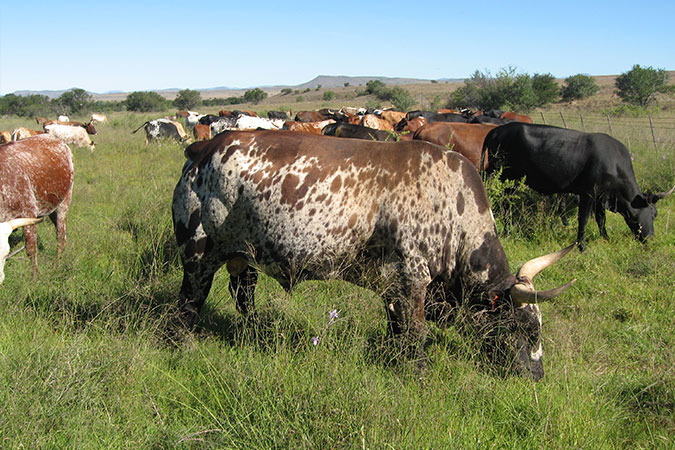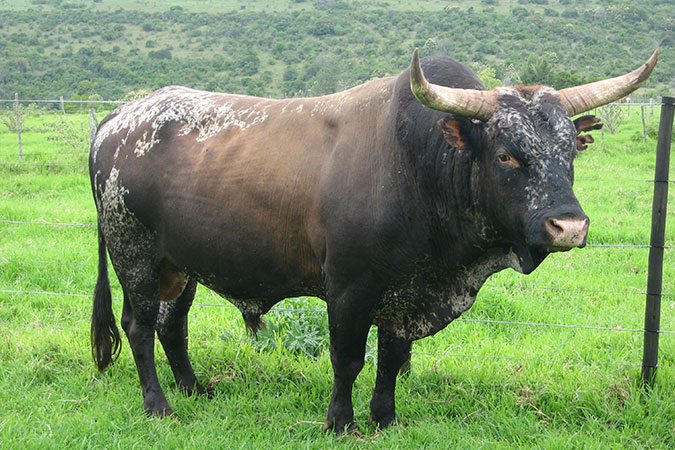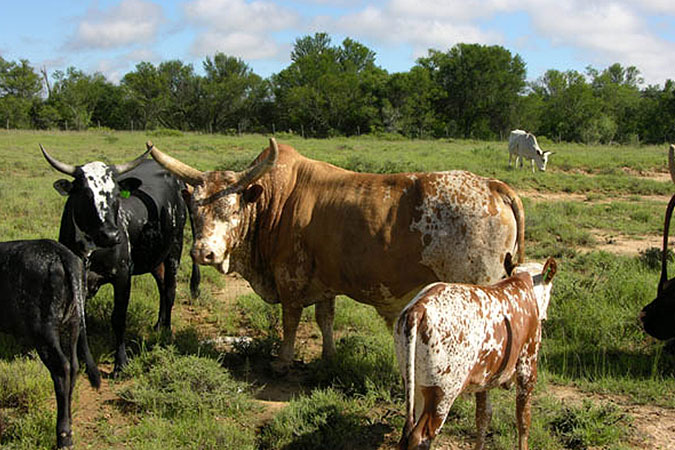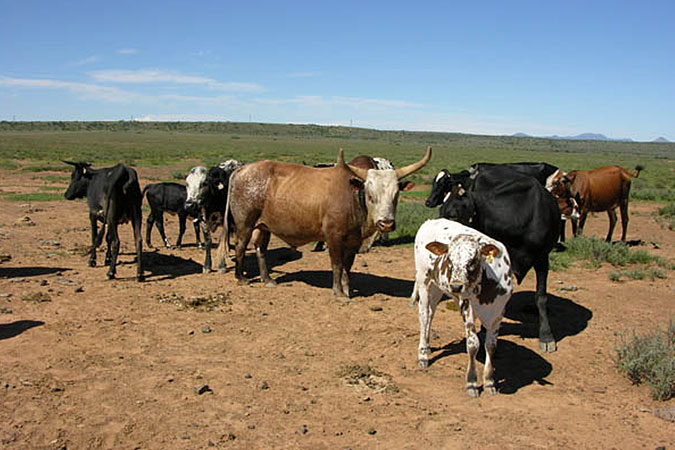Ntsikizi means Ground hornbill
All cattle are run on hired grazing.
The home herd currently runs at Chefane on the coast east of East London. This coastal farm has the high water mark as its boundary and is bordered by the Kwenxura river on the east and the Chefane river on the west. The grazing like most of this coastal belt is poor with sandy soils and massive problems with bush encroachment. Due to being situated on the coast with high rainfall , high humidity levels, temperate climate and no frost tick infestation is exceptionally high.
Dipping is kept to the absolute minimum in a effort to maintain high immunity levels to tick borne diseases but at the same time being realistic so as to protect cattle from udder damage and screwworm attacks.
There are no cultivated pastures or crops grown so the cattle farming operation is veld based. The following grass species are the most dominant. Giant turpentine , bundle thatching grass , pinhole grass in areas where mechanical bush clearing was previously done , ngongoni three-awn and coastal buffalo grass in areas adjoining coastal dunes and along river banks. Due to the low grazing value and unpalatability of the veld grasses rumen stimulating licks are provided in winter and phosphate licks during summer. No grain is ever added to licks. Conditions on this stretch of coast are extremely tough for cattle, by far the most challenging our cattle have had to contend with.
A small herd of naturally polled animals of Makatini origin are run near Hopetown in the Northern Cape. These cattle are not dipped nor are they supplied with any licks as it is not necessary. Veldt is sparse but of excellent quality. Wean (205 days) weights here are 15 to 20 kg higher than on the coast despite these cows being smaller due to their Makatini origin.
In November 2015 we were fortunate in being able to secure grazing in the Sterkstroom district just north of Queenstown. Cattle that were moved there in November are doing exceptionally well and we are excited about their future there.
Selection is based on efficiency of production whilst ensuring we don't compromise on phenotypical aspects. Performance recording has been done since 2004 and the figures generated by this are used as part of our selection guidelines. We are very aware and sensitive to not follow a selection process that is at odds with what nature gave us in the Nguni.
Cattle are run in large groups to optimise grazing management so multi siring with D.N.A. parentage verification is part of normal herd management.
The herd was started in 1982 and due to being run on hired grazing has been in the following areas Port Alfred , Kei River valley , Stutterheim , Tarkastad , Willowmore , Beaufort West Nieu-Bathesda , Alexandria , Cradock , Komga and now on the coast +- 40 km east of East London plus Hopetown and Sterkstroom. This constant moving to vastly different areas each with their own unique challenges has resulted in a herd with exceptional adaptability.
The initial cattle were purchased in the following areas: 1982 Makatini Flats - Kosi Bay area , 1985 Lebombo mountains - east of Josini dam - Mkuze , 1998 Makatini Flats - Lake Sibaya area , 1999 Doug Reed - Duiwelskloof , 2000 & 2001 Hartmut Held - Namibia and some Sandveld and Moedsoncattle from research stations Namibia. The cow herd has been closed since then.
Some bulls that have had a positive impact on the herd:
Z 14 a Makatini bull,
S 84-136 Mkhaya Mfelane
C 92-43 "Vleis"
,HW 96-16 "Cresman" ,
H 97-365 "Savimbi" a Sanga bull,
TOL 02-72 "Mabala" a Sanga bull ,
HW 02-5 , PH 02-9 " Fezile",
PH 04-7 " Simpiwe" a naturally polled Cresman son,
PH 04-37 " Vuyani " a Savimbi son out of a Makatini cow, WJ 04-76.
The current string of bulls are still hard at work and time will tell if any of them will qualify to be added to this list.
Our farming operation is :
based on belief in the ability of our breed of choice driven by a passion for what we do sustained by tenacity to face whatever " curved ball " comes our way.
Enjoy your Nguni farming and consider yourself privileged to be able to farm with a breed that is the closest to the concept of Natural Selection.
All cattle are run on hired grazing.
The home herd currently runs at Chefane on the coast east of East London. This coastal farm has the high water mark as its boundary and is bordered by the Kwenxura river on the east and the Chefane river on the west. The grazing like most of this coastal belt is poor with sandy soils and massive problems with bush encroachment. Due to being situated on the coast with high rainfall , high humidity levels, temperate climate and no frost tick infestation is exceptionally high.
Dipping is kept to the absolute minimum in a effort to maintain high immunity levels to tick borne diseases but at the same time being realistic so as to protect cattle from udder damage and screwworm attacks.
There are no cultivated pastures or crops grown so the cattle farming operation is veld based. The following grass species are the most dominant. Giant turpentine , bundle thatching grass , pinhole grass in areas where mechanical bush clearing was previously done , ngongoni three-awn and coastal buffalo grass in areas adjoining coastal dunes and along river banks. Due to the low grazing value and unpalatability of the veld grasses rumen stimulating licks are provided in winter and phosphate licks during summer. No grain is ever added to licks. Conditions on this stretch of coast are extremely tough for cattle, by far the most challenging our cattle have had to contend with.
A small herd of naturally polled animals of Makatini origin are run near Hopetown in the Northern Cape. These cattle are not dipped nor are they supplied with any licks as it is not necessary. Veldt is sparse but of excellent quality. Wean (205 days) weights here are 15 to 20 kg higher than on the coast despite these cows being smaller due to their Makatini origin.
In November 2015 we were fortunate in being able to secure grazing in the Sterkstroom district just north of Queenstown. Cattle that were moved there in November are doing exceptionally well and we are excited about their future there.
Selection is based on efficiency of production whilst ensuring we don't compromise on phenotypical aspects. Performance recording has been done since 2004 and the figures generated by this are used as part of our selection guidelines. We are very aware and sensitive to not follow a selection process that is at odds with what nature gave us in the Nguni.
Cattle are run in large groups to optimise grazing management so multi siring with D.N.A. parentage verification is part of normal herd management.
The herd was started in 1982 and due to being run on hired grazing has been in the following areas Port Alfred , Kei River valley , Stutterheim , Tarkastad , Willowmore , Beaufort West Nieu-Bathesda , Alexandria , Cradock , Komga and now on the coast +- 40 km east of East London plus Hopetown and Sterkstroom. This constant moving to vastly different areas each with their own unique challenges has resulted in a herd with exceptional adaptability.
The initial cattle were purchased in the following areas: 1982 Makatini Flats - Kosi Bay area , 1985 Lebombo mountains - east of Josini dam - Mkuze , 1998 Makatini Flats - Lake Sibaya area , 1999 Doug Reed - Duiwelskloof , 2000 & 2001 Hartmut Held - Namibia and some Sandveld and Moedsoncattle from research stations Namibia. The cow herd has been closed since then.
Some bulls that have had a positive impact on the herd:
Z 14 a Makatini bull,
S 84-136 Mkhaya Mfelane
C 92-43 "Vleis"
,HW 96-16 "Cresman" ,
H 97-365 "Savimbi" a Sanga bull,
TOL 02-72 "Mabala" a Sanga bull ,
HW 02-5 , PH 02-9 " Fezile",
PH 04-7 " Simpiwe" a naturally polled Cresman son,
PH 04-37 " Vuyani " a Savimbi son out of a Makatini cow, WJ 04-76.
The current string of bulls are still hard at work and time will tell if any of them will qualify to be added to this list.
Our farming operation is :
based on belief in the ability of our breed of choice driven by a passion for what we do sustained by tenacity to face whatever " curved ball " comes our way.
Enjoy your Nguni farming and consider yourself privileged to be able to farm with a breed that is the closest to the concept of Natural Selection.
Contact Us
Pat Hobbs
082 773 7298
patmarg@telkomsa.net




